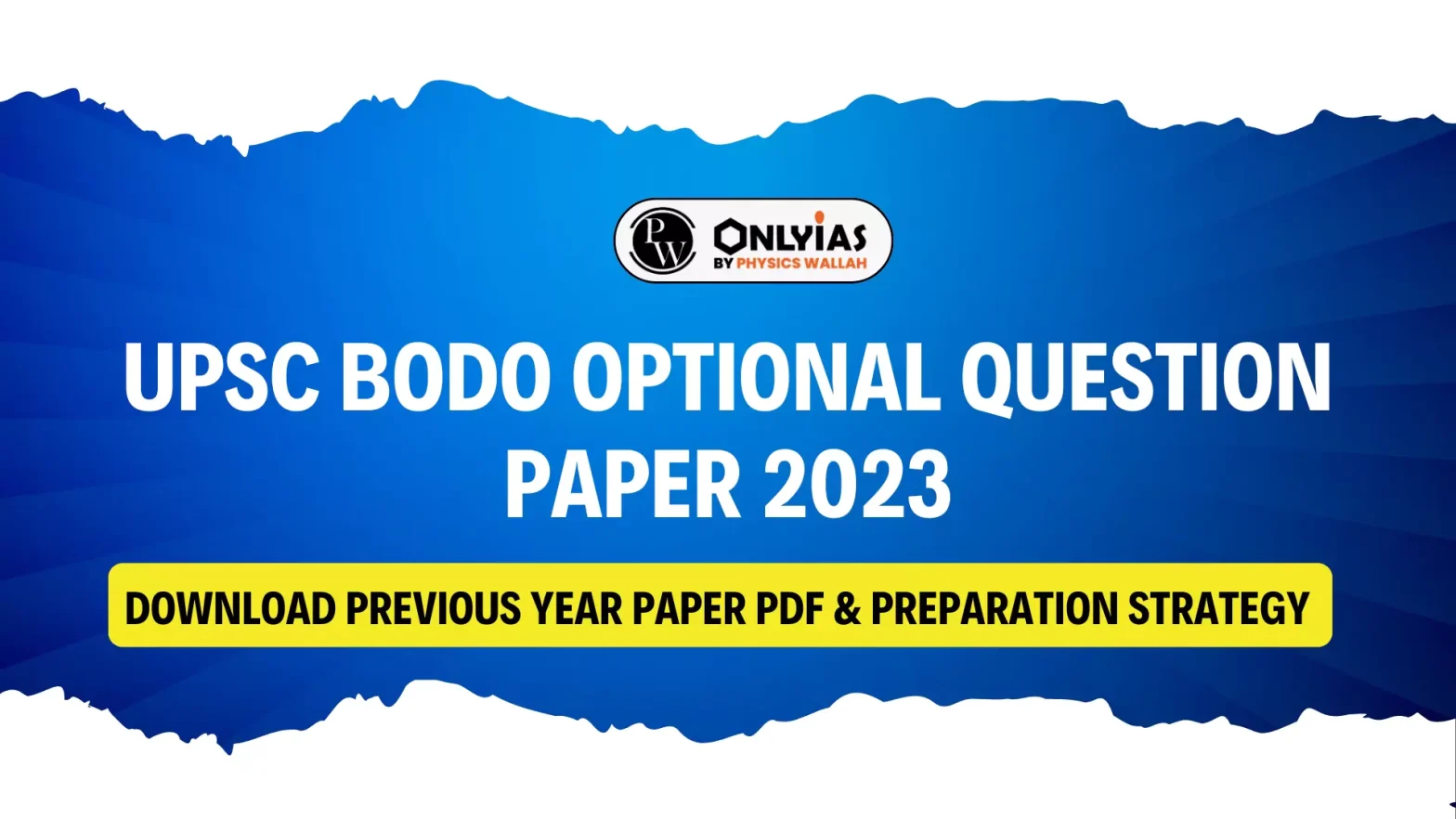UPSC Bodo Optional Question Paper 2023 helps aspirants to prepare for the examination well. Check and download UPSC Bodo Optional Previous Year Paper from the article given below.

The UPSC Bodo Literature Optional Paper covers a range of important topics, including Homeland, language family, Phonemes (sounds), Vowel and Consonant Phonemes, Tones (intonation), Plural suffixes (word endings), Definitive (defining words), Morphology (word structure), Verbal suffix (word endings in verbs), Vocabulary (word knowledge), and their sources (origins).
The UPSC Bodo Literature syllabus consists of two papers, namely Paper-1 and Paper-2. Similar to other optional papers in the UPSC Mains exam, the Bodo optional paper carries a total of 500 marks, with each paper contributing 250 marks.
UPSC Bodo Optional Question Paper 1 consists of topics, including the historical evolution of the Bodo language, examining aspects like its homeland, language family, current status, and interactions with Assamese. Furthermore, candidates explore the intricacies of phonetics, encompassing Vowel and Consonant Phonemes, as well as Tones, which pertain to the nuances of pronunciation.
Morphology is another key area covered, delving into Gender, Case, Case Endings, Plural Suffixes, Definitives (which clarify word meanings), and Verbal Suffixes, essential for understanding word structure and usage. Vocabulary acquisition and its sources are also emphasized, facilitating a comprehensive grasp of word knowledge.
UPSC Bodo Optional Paper 2 is divided into two parts. In Part A, you will study Khonthai-Methai, Hathorkhi-Hala, Boroni Gudi Sibsa Arw Aroz by Madaram Brahma, Raja Nilambar by Dwarendra Nath Basumatary, and the prose section called Bibar.
Part B includes Bibi Bithai (Aida Nwi) by Bihuram Boro, Radab by Samar Brahma Chaudhury, Okhrang Gongse Nangou by Brajendra Kumar Brahma, Baisagu Arw Harimu by Laksheswar Brahma, Gwdan Boro by Manoranjan Lahary, Jujaini Or by Chittaranjan Muchahary, Mwihoor by Dharanidhar Wary, Hor Badi Khwmsi by Kamal Kumar Brahma, and Jaolia Dewan by Mangal Singh Hozowary, as well as Hagra Guduni Mwi by Nilkamal Brahma. The paper should be written in Bodo language.
Check the UPSC Bodo Previous Year Questions in the table given below:
| Year | Paper 1 |
| 2017 | UPSC Optional Bodo Literature Paper I |
| 2018 | UPSC Optional Bodo Literature Paper I |
| 2019 | UPSC Optional Bodo Literature Paper I |
| 2020 | UPSC Bodo Compuslory 2020 PDF |
| 2021 | UPSC Bodo Compuslory 2021 PDF |
Identify Key Topics
Start by breaking down the UPSC Bodo Literature Optional Syllabus into its essential topics. A great way to do this is by practicing with past UPSC papers to understand which topics carry more weight.
Take Effective Notes
Cultivate the habit of taking notes on the crucial subjects that are likely to appear in the exam. These notes will be invaluable in helping you achieve a high score.
Manage Your Time Wisely
Create a study schedule that allocates specific time slots for each important concept. Effective time management is crucial for excelling in your exam.
Practice with Past Papers
After covering the syllabus, start solving previous year’s question papers. This will reveal your strengths and weaknesses, enabling you to adjust your preparation accordingly.
Thoroughly Review the Syllabus
Before diving into your exam preparation, thoroughly review the entire syllabus. You can find the detailed syllabus in the UPSC Notification or download a PDF version to ensure you focus on the crucial topics.
| UPSC Optional Paper Related Links | |
| UPSC Anthropology Optional Paper | UPSC Civil Engineering Optional Paper |
| UPSC Physics Optional Paper | UPSC Chemistry Optional |
<div class="new-fform">
</div>